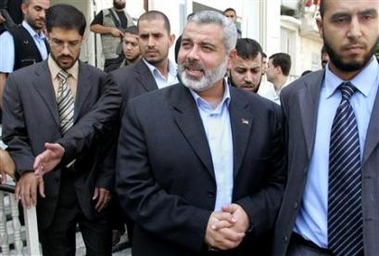GAZA - Prime Minister Ismail
Haniyeh of Hamas said on Sunday talks on a Palestian unity government could
still succeed, brushing aside President Mahmoud Abbas's comment that they had
reached "point zero" and must start from scratch.
"We will resume the consultations over the formation of a national unity
government and I believe we have gone a long way down the road," Haniyeh told
reporters in the Gaza Strip. "There is a real hope that it will succeed."

Palestinian Prime Minister Ismail
Haniyeh (2nd R) arrives to his office in Gaza September 17, 2006.
President Mahmoud Abbas has frozen talks on forming a Palestinian unity
government after Hamas said it would not accept interim peace deals with
Israel, two of his aides said on Sunday. But Haniyeh said talks had only
been put on hold while Abbas visited New York this week. Other Hamas
officials said while there were differences of opinion, formation.
[Reuters] |
Abbas plans to travel to Gaza on Monday or Tuesday to resume talks, which he
froze a week ago before attending the U.N. General Assembly in New York, senior
aide Saeb Erekat said.
Erekat said Abbas would tell Hamas: "If you want a unity government, there
are international requirements that need to be met, and that's the only way to
form a unity government."
The moderate Abbas has accused Haniyeh and other Hamas leaders of reneging on
an agreement reached earlier this month on a political programme for a unity
government that included recognition of interim peace deals with Israel.
The row centres on agreeing a political agenda for the unity coalition that
is clear enough in recognition of Israel to satisfy the West but vague enough
for Hamas to say it does not contradict their charter, which calls for Israel's
destruction.
Palestinians hope formation of a unity government will prompt Western powers
to ease an aid embargo that has increased poverty and lawlessness in Gaza and
the occupied West Bank.
The aid embargo was imposed when Hamas came to power in March to pressure the
Islamic militant group to meet three conditions: recognise Israel, renounce
violence and abide by interim peace deals.
A breakdown in unity talks could trigger fighting between rival armed
factions loyal to Hamas and Abbas's Fatah movement. Hamas trounced Fatah in
parliamentary elections in January.
In a challenge to Abbas, four militant groups threatened to attack any unity
government that recognises Israel.
"Any coming (Palestinian unity) government that recognises Israel and its
right to existence will be a legitimate target for us," said Abu Abir, spokesman
for the Popular Resistance Committees. "We will fight it by all means and we
will deal with it as an extension of the Zionist occupation."
MAJOR OBSTACLES TO DEAL
Yasser Abed Rabbo, an official with the umbrella Palestine Liberation
Organisation headed by Abbas, said a unity government would not be possible
unless Hamas accepted interim peace deals, an Arab peace initiative and U.N.
resolutions.
"Otherwise it will suffer in the same way that the Hamas-monopolised
government suffered," he said.
Washington has threatened to shun Fatah members who join a government led by
Hamas if that government does not meet the three conditions.
Abbas, who met U.S. President George W. Bush at the United Nations last week,
is under U.S. pressure to force Hamas to make concessions. Washington had hoped
Abbas would sack the Hamas-led government, not join it.
Speaking at the U.N. General Assembly on Thursday, Abbas said "any future
Palestinian government" would honour all previous interim peace accords with
Israel. Hamas said it would not join any unity government that recognised
Israel.
"Unfortunately, we are back to point zero," Abbas said on Saturday of the
unity talks.
The impasse in unity government talks come as economic conditions worsen for
Palestinians.
A poll published on Sunday showed 73 percent of 165,000 Palestinian
government workers are no longer able to make ends meet because of unpaid wages
and 22 percent wish to emigrate.
"The suffering is real," said Samir Hleleh, managing director of British firm
Portland Trust which conducted the survey with the Palestinian Economists
Association.